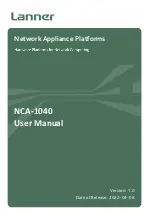
BGI, which takes a longer time to complete. To perform a fast initialization using the
BIOS Configuration
Utility
, see
Initializing Virtual Disks
.
NOTE: Fast initialization does not support RAID 6 and RAID 60 virtual disks with the PI feature
enabled.
Background Initialization
Background Initialization (BGI) is an automated process that writes the parity or mirror data on newly
created virtual disks. BGI does not run on RAID 0 virtual disks. You can control the BGI rate in the Dell
OpenManage storage management application. Any change in the BGI rate does not take effect until the
next BGI run.
NOTE: BGI will run on RAID 0 virtual disks only with PI enabled.
NOTE: You cannot disable BGI permanently. If you cancel BGI, it automatically restarts within five
minutes. For information on stopping BGI, see
Stopping Background Initialization
.
NOTE: Unlike full or fast initialization of virtual disks, background initialization does not clear data
from the physical disks.
NOTE: Consistency Check (CC)/BGI typically causes some loss in performance until the operation
completes.
NOTE: VD with PI will have a longer background initialization when compared to non-PI virtual
disks.
Consistency Check (CC) and BGI perform similar functions in that they both correct parity errors.
However, CC reports data inconsistencies through an event notification, but BGI does not. You can start
CC manually, but not BGI.
Consistency Checks
Consistency Check (CC) is a background operation that verifies and corrects the mirror or parity data for
fault tolerant virtual disks. It is recommended that you periodically run a consistency check on virtual
disks.
You can manually start a CC using the
BIOS Configuration Utility
or the Dell OpenManage storage
management application. You can schedule a CC to run on virtual disks using the Dell OpenManage
storage management application. To start a CC using the
BIOS Configuration Utility
, see
Checking Data
Consistency
.
NOTE: CC/BGI typically causes some loss in performance until the operation completes.
Consistency Check (CC) and BGI both correct parity errors. However, CC reports data inconsistencies
through an event notification, but BGI does not. You can start CC manually, but not BGI.
Disk Roaming
Disk roaming is moving the physical disks from one cable connection or backplane slot to another on the
same controller. The controller automatically recognizes the relocated physical disks and logically places
them in the virtual disks that are part of the disk group. You can perform disk roaming only when the
system is turned off.
18
Summary of Contents for PowerEdge H730P
Page 9: ...Contacting Dell 101 Documentation Feedback 101 Locating Your System Service Tag 101 ...
Page 10: ...10 ...
Page 14: ...14 ...
Page 32: ...11 backplane jumper cable connector on the backplane 32 ...
Page 38: ...38 ...
Page 70: ...70 ...
Page 84: ...Figure 5 Disk Carrier LED Indicators 1 activity LED 2 status LED 84 ...
Page 100: ...100 ...
















































